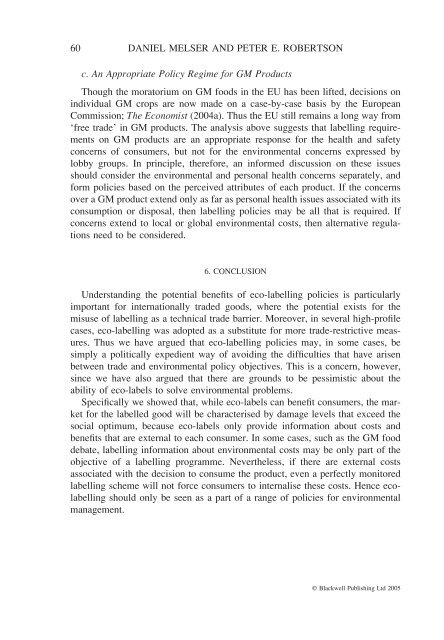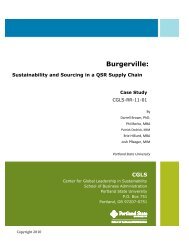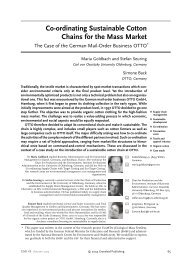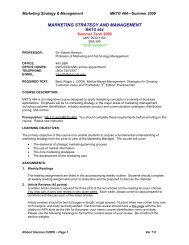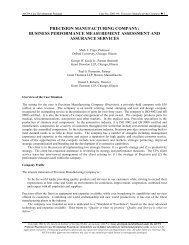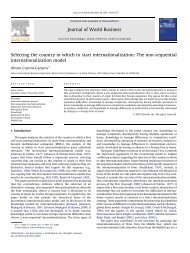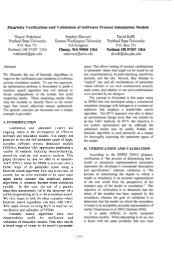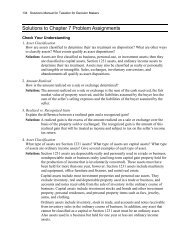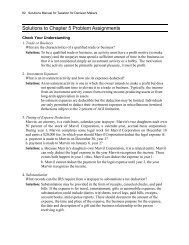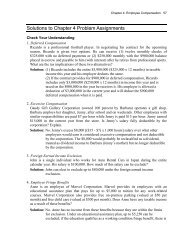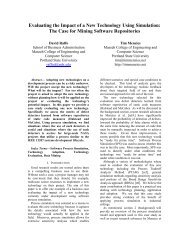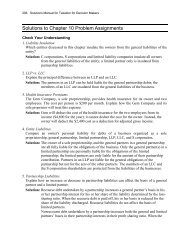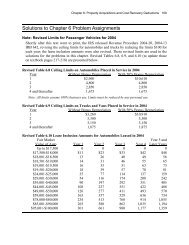Eco-labelling and the Trade-Environment Debate
Eco-labelling and the Trade-Environment Debate
Eco-labelling and the Trade-Environment Debate
You also want an ePaper? Increase the reach of your titles
YUMPU automatically turns print PDFs into web optimized ePapers that Google loves.
60 DANIEL MELSER AND PETER E. ROBERTSON<br />
c. An Appropriate Policy Regime for GM Products<br />
Though <strong>the</strong> moratorium on GM foods in <strong>the</strong> EU has been lifted, decisions on<br />
individual GM crops are now made on a case-by-case basis by <strong>the</strong> European<br />
Commission; The <strong>Eco</strong>nomist (2004a). Thus <strong>the</strong> EU still remains a long way from<br />
‘free trade’ in GM products. The analysis above suggests that <strong>labelling</strong> requirements<br />
on GM products are an appropriate response for <strong>the</strong> health <strong>and</strong> safety<br />
concerns of consumers, but not for <strong>the</strong> environmental concerns expressed by<br />
lobby groups. In principle, <strong>the</strong>refore, an informed discussion on <strong>the</strong>se issues<br />
should consider <strong>the</strong> environmental <strong>and</strong> personal health concerns separately, <strong>and</strong><br />
form policies based on <strong>the</strong> perceived attributes of each product. If <strong>the</strong> concerns<br />
over a GM product extend only as far as personal health issues associated with its<br />
consumption or disposal, <strong>the</strong>n <strong>labelling</strong> policies may be all that is required. If<br />
concerns extend to local or global environmental costs, <strong>the</strong>n alternative regulations<br />
need to be considered.<br />
6. CONCLUSION<br />
Underst<strong>and</strong>ing <strong>the</strong> potential benefits of eco-<strong>labelling</strong> policies is particularly<br />
important for internationally traded goods, where <strong>the</strong> potential exists for <strong>the</strong><br />
misuse of <strong>labelling</strong> as a technical trade barrier. Moreover, in several high-profile<br />
cases, eco-<strong>labelling</strong> was adopted as a substitute for more trade-restrictive measures.<br />
Thus we have argued that eco-<strong>labelling</strong> policies may, in some cases, be<br />
simply a politically expedient way of avoiding <strong>the</strong> difficulties that have arisen<br />
between trade <strong>and</strong> environmental policy objectives. This is a concern, however,<br />
since we have also argued that <strong>the</strong>re are grounds to be pessimistic about <strong>the</strong><br />
ability of eco-labels to solve environmental problems.<br />
Specifically we showed that, while eco-labels can benefit consumers, <strong>the</strong> market<br />
for <strong>the</strong> labelled good will be characterised by damage levels that exceed <strong>the</strong><br />
social optimum, because eco-labels only provide information about costs <strong>and</strong><br />
benefits that are external to each consumer. In some cases, such as <strong>the</strong> GM food<br />
debate, <strong>labelling</strong> information about environmental costs may be only part of <strong>the</strong><br />
objective of a <strong>labelling</strong> programme. Never<strong>the</strong>less, if <strong>the</strong>re are external costs<br />
associated with <strong>the</strong> decision to consume <strong>the</strong> product, even a perfectly monitored<br />
<strong>labelling</strong> scheme will not force consumers to internalise <strong>the</strong>se costs. Hence eco<strong>labelling</strong><br />
should only be seen as a part of a range of policies for environmental<br />
management.<br />
© Blackwell Publishing Ltd 2005


